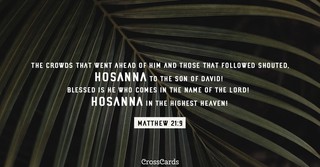
- Recent Translations
- All Translations
Matthew 21:7
Share
Settings
Matthew 21:7 Meaning and Commentary
And brought the ass and the colt
To Jesus, as Mark and Luke add, and who only make mention of the colt: both were undoubtedly brought; the colt being unloosed and taken away, the ass, its dam, followed after:
and put on them their clothes;
their loose upper garments, to be instead of saddles and trappings, and that Christ might sit thereon with ease and decency: the other evangelists say, that they cast their garments on the colt; and the Syriac version here reads, "they put their garments on the colt, and Jesus rode upon it": but as both were brought, it is clear from hence, that their clothes were put upon both; not knowing which Christ would choose to ride on. And it should seem, that it was not unusual to put garments on asses to ride on; for the Targumist on ( Judges 5:10 ) represents the princes of Israel as riding upon asses, strewed or saddled with all kind (Nyrwyu) , of "painted garments". The Persic version, without the least colour of authority from the original text, renders it, "and Jesus put his own garment on the colt, and sat thereon"; which is ridiculous, as well as contrary to truth:
and they sat him thereon,
or "on them": meaning either on the ass and colt, that is, on one of them, or both successively, or on the clothes they put upon them.

